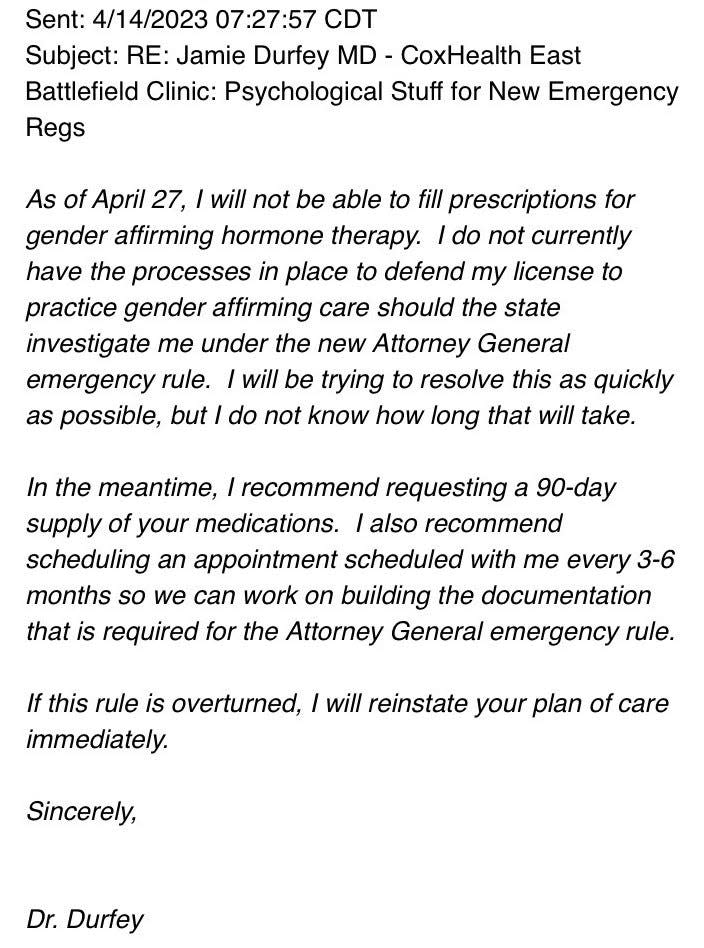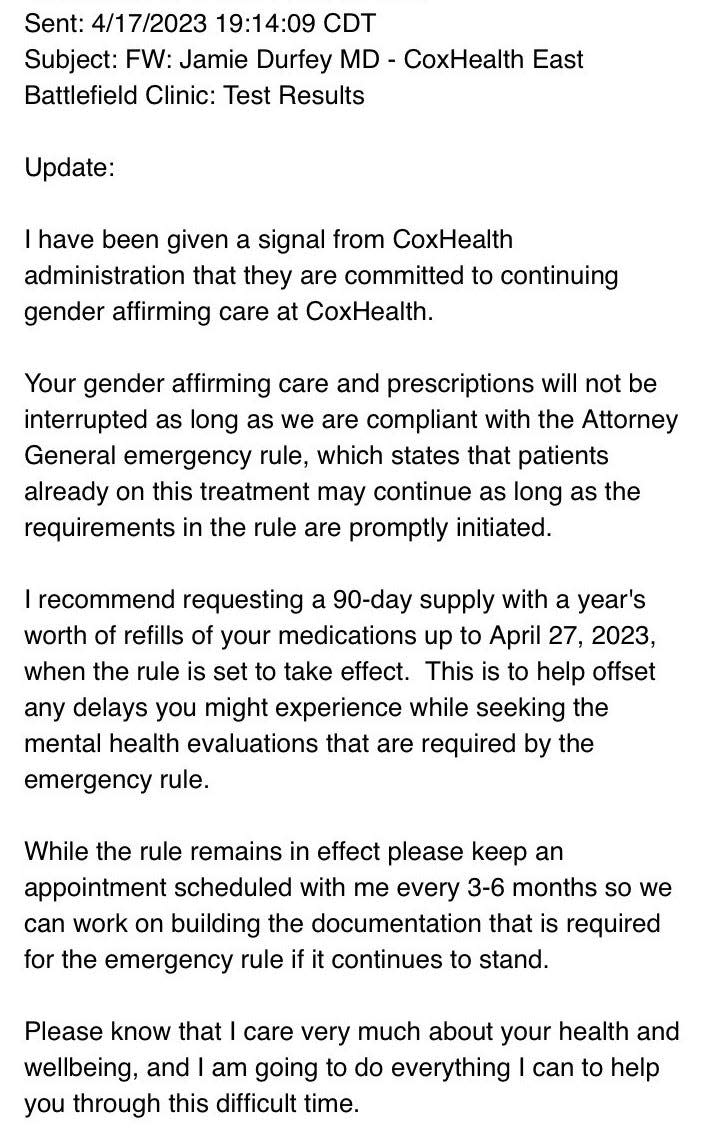In wake of AG's emergency rule, trans Ozarkers fear for safety, access to care
Nathalie "Hal" Dempsey and Andy Rodenbusch said they feel like they've spent their entire lives living in "enemy territory," and although they wanted to leave Missouri eventually, they didn't expect to plan their move on just a few weeks notice.
Dempsey, 24, Rodenbusch, 24, and their third partner, who did not wish to be named, are all impacted by Missouri Attorney General Andrew Bailey's emergency rule, which prohibits "experimental interventions to treat gender dysphoria." Announced last week, the emergency rule will go into effect Thursday, April 27 and could extend through Feb. 6, 2024.
The rule enacts strict guidelines on how patients may receive and how medical teams may provide gender-affirming care. Referred to as "covered gender transition intervention" in the rule language, this includes "puberty-blocking drugs, cross-sex hormones or surgery, for the purpose of transitioning gender, decreasing gender incongruence or treating gender dysphoria."
After learning about the emergency rule last week, Dempsey, Rodenbusch and their partner made the decision to start preparing to leave the state. For them, the decision to leave was a matter of survival.

As part of their gender-affirming care, Dempsey had bottom surgery, the removal of their biological primary reproductive organs, or gonads. Without naturally producing gonads, Dempsey relies on estrogen hormones they receive through a transdermal sticker-like patch.
“I can’t produce my own sex hormones and there’s no clause for that in the emergency order, so I would be without hormones at all, which can be life-threatening,” Dempsey said.
Dempsey began their hormone replacement therapy in March 2019. They said the ban doesn't only effect them physically but mentally and emotionally.
“I know, for me at least, if I was trapped here and unable to move and didn’t have the resources or a support network here, I’m not sure that I would want to continue being alive,” Dempsey said.
Under the emergency rule, Dempsey, Rodenbusch, their partner and the three's medical providers must jump through more "hoops" to ensure they receive adequate care.
What does the emergency rule regulate?
The emergency rule states it is "unfair, deceptive, fraudulent or otherwise unlawful practice" for a person or health organization to provide "gender transition intervention" to a patient if the health provider or organization:
Fails to annually assess whether the patient continues to have gender dysphoria;
Fails to provide the patient with informed consent about the risks of gender-affirming care;
Fails to ensure that for at least the three most recent consecutive years the patient has exhibited a medically-documented pattern of gender dysphoria;
Fails to ensure the patient has received a "full psychological or psychiatric assessment," consisting of at least 15 separate, hourly sessions over the course of not fewer than 18 months to "explore the developmental influences on the patient's current gender identity";
Fails to ensure that any previous mental health diseases have been treated;
Fails to ensure that the patient has received a comprehensive autism screening;
Fails to ensure the patient has received a comprehensive screening for "social media addiction or compulsion" and has not, for at least six months, suffered from "social media addiction or compulsion";
Fails to annually ensure the patient is not experiencing social contagion, or being influenced by others about their gender identity;
Fails to adopt and follow a procedure to track all negative side effects that may arise from covered gender transition intervention over the course of the first 15 years;
Fails to maintain data about negative side effects in a format that is easily accessible for study or
Fails to obtain and keep on file informed, written consent from the patient, and if a patient is a minor, from guardians.
The rule has an exemption for children experiencing precocious puberty, or puberty beginning before age 8 in girls and before age 9 in boys, as well as people who are intersex. In those cases, providers do not have to meet all the requirements before providing treatment.
Across the nation, attorneys general are the main enforcers of consumer protection in their respective states, according to the National Association of Attorneys General. Consumer protections include issues of health, safety and privacy.
The emergency rule states that gender-affirming care like puberty blockers or hormone replacement therapy is "used in circumstances not supported by solid evidence," and because of that, it falls under the attorney general's purview of "protecting consumers, including minors, from harm and investigating fraud and abuse in the state’s health care payment system."
Following an affidavit from an employee of the Pediatric Transgender Center St. Louis Children's Hospital, Bailey launched an investigation into gender-affirming care in Missouri. This included Planned Parenthood, which is suing Bailey for the civil investigative demand he filed.
Lambda Legal and the ACLU of Missouri have indicated they will be taking legal action against the emergency regulation. Lambda Legal is an organization that advocates for civil rights for the LGBTQ community.
"This rule is a shocking attempt to exploit Missouri’s consumer protection laws in order to play politics with life-saving medical care," the organizations said in a joint statement on April 13.
Counseling is integral to gender-affirming care but requiring it, along with other assessments, may exclude people
Becca Reynolds, 61, began seeking gender-affirming care in the early 2000s, starting hormone replacement therapy in 2005. Prior to seeking hormone replacement therapy, Reynolds was in counseling, which she described as one of, if not the, most important part of gender-affirming care.
“As we jokingly say, if you don’t do the couch time, you’re building your house on a foundation of wet sand and it’s going to come tumbling down,” Reynolds said.
However, the emergency rule adding legal requirements for counseling and assessments of developmental delays is not in line with current best practices.
Counseling and meeting with a therapist is an integral part of seeking gender-affirming care, however it is not always accessible to everyone on a timely basis. The most recent version of the World Professional Association for Transgender Heath's Standards of Care addresses this by removing what they call "unnecessary barriers" to medical interventions and instead putting a greater emphasis on "individualized assessment, treatment planning, and clinician training including (trans and gender-diverse)-specific continuing education." Founded in 1979, WPATH's Standards of Care for transgender and non-binary individuals are recognized internationally.
The emergency rule states that a healthcare provider or system must ensure that a patient has received a comprehensive autism screening before receiving gender-affirming care to ensure claims of gender dysphoria aren't affiliated with the development disability. In Missouri, the wait for an autism diagnostic evaluation can be at least a year.

Springfield resident Romeo, 23, who wished to use only his middle name due to safety concerns in the community and at work, met with a therapist, the same therapist he meets with today, before starting gender-affirming care. After receiving a gender dysphoria diagnosis from his therapist, Romeo started hormone replacement therapy in February 2021, with the help of a provider at AIDS Project of the Ozarks.
In addition to Romeo's gender dysphoria diagnosis, his therapist diagnosed him with autism. He has not received a formal medical diagnosis and said after learning about the emergency rule's language about autism, doesn't plan to.
"I'm not planning on getting that diagnosis now. I would like to for the validation of it, but now it's not an option," Romeo said.
Like Romeo, Springfield artist Peewee, who asked to go only by his professional moniker due to safety concerns and the threat of state action, has been diagnosed with autism by his therapist. He was also considering seeking a diagnostic evaluation until the emergency rule's language was published.
"I think (a diagnosis) could really help me, but at the same time, if it's going to be used to persecute me, absolutely not," Peewee said.
Romeo and Peewee are not outliers, as autism is prevalent in the transgender community. A 2020 paper published in Nature Communications found that transgender and gender non-conforming individuals were 3% to 6% more likely to be diagnosed with autism than their cisgender counterparts.
A place they love, 'taken away'

While leaving Missouri was a plan on the horizon, Dempsey and Rodenbusch said they don't necessarily feel prepared, or interested, in uprooting at this time. Nonetheless, they continued to reiterate how "lucky and privileged" they feel to be able to leave when they can.
To help offset the financial strain of their move, the three decided to make a GoFundMe fundraiser. As of Friday, the fundraiser has raised more than $1,700 of the $2,000 goal.
In addition to the fundraiser, Dempsey said they donated plasma for the first time this week and the three plan on hosting a garage sale soon to raise more money.
Dempsey said the three plan on moving to the Quad Cities area in Illinois because they have friends who live there. They hope to be moved by late May or early June.

“I really do love the Ozarks; I love Missouri and I think it’s beautiful here,” Dempsey said. “I’ve lived here all my life. It doesn’t feel fair. I think a lot of people who feel opposed to me feel the same way about this place, about this state, and they also love their freedom and ability to live here. I just keep thinking about how they would feel if that was taken away from them, if a place they loved was taken away from them. It’s really disheartening and sad. I want to cry.”
An uncertainty about next steps
The emergency rule states that a healthcare provider or system must ensure that for "at least the three most recent consecutive years, the patient has exhibited a medically documented, long-lasting, persistent and intense pattern of dysphoria" to receive gender-affirming care.
For individuals who recently began gender-affirming care, within this three-year window, moving forward with care under the rule will be difficult.
Emerson Evans, 33, began hormone replacement therapy in September 2022, so he falls into this three-year window.
When he began hormone replacement therapy, Evans used Plume Health, a virtual healthcare system for transgender and nonbinary individuals. But after moving to Springfield in December 2022, Evans was unable to afford paying for Plume, so he canceled his subscription. Since, he has been without an active prescription for his hormone replace therapy.
Although Plume previously announced that it would no longer provide gender-affirming care in Missouri, the company said on Friday, April 21, that it would provide this care at no cost for Missouri residents. Evans said he was able to schedule an appointment through Plume for Monday.
Prior to Plume's most recent announcement, Evans said he had about three months left of his current prescription left.
Given the way that testosterone works, Peewee said he wasn't entirely sure what the attorney general's goal was in putting restrictions on hormone replacement therapy, "except to just make people scared."
"There's not a way for me to de-transition, because even if you go off (testosterone, its effects) are permanent," Peewee said. "Even if that was something I could mentally and emotionally do, I'd have to get laser hair removal. They'd just think I was a trans woman. There's no winning for me. There's no closet to go back into."
Gwendolyn Schwarz, 23, sees Dr. Jamie Dee Durfey at CoxHealth for her gender-affirming care. Despite having established care in Springfield, Schwarz said she attended a pop-up clinic hosted by Planned Parenthood to meet with a provider about future plans for filling her prescription.
On Monday, April 17, Planned Parenthood of the St. Louis Region and Southwest Missouri held three gender-affirming care pop-up clinics in St. Louis, Springfield and Fairview Heights, Illinois. Folks who were not previously seeing a provider at a Planned Parenthood branch had the option to meet with one during this one-day event. Schwarz was able to secure a spot at the Springfield pop-up before they quickly filled.
PPSLR also added additional appointments for new patients seeking to start gender-affirming hormone therapy in all of their locations until Wednesday, April 26. As of Friday, nearly all of those appointments were full, according to PPSLR communications director Julie Lynn.
Schwarz said she felt the need to establish care at Planned Parenthood, in addition to CoxHealth, after receiving an email from Durfey the day after the announcement of the emergency rule.
On Friday, April 14, Durfey's patients received an email through the Cox Health system regarding future gender-affirming care:
“As of April 27, I will not be able to fill prescriptions for gender-affirming hormone therapy. I do not currently have the processes in place to defend my license to practice gender-affirming care should the state investigate me under the new Attorney General emergency rule. I will be trying to resolve this as quickly as possible, but I do not know how long that will take.”

In her message, Durfey also recommended that her patients request a 90-day supply of their medication to ensure they have medication on hand when the emergency ban goes into effect. Per Durfey's recommendation, Schwarz requested a three-month supply of her medication.
In addition to her appointment at the Springfield Planned Parenthood pop-up clinic, Schwarz said she scheduled an appointment at the Planned Parenthood in Fairview Heights, Illinois, in case receiving gender-affirming care in Missouri is no longer feasible for her.
Following her initial message to patients, Durfey sent a follow-up on Monday, April 17, indicating that she received clearance from the hospital system to continue gender-affirming care.
“Please know that I care very much about your health and wellbeing, and I am going to do everything I can to help you through this difficult time,” Durfey wrote in her message.

In a statement on Thursday, April 20, CoxHealth reaffirmed its "mission is to improve the health of the communities we serve" by serving all patients, within the legal requirements.
"CoxHealth plans to abide by the rule as it is written, and our providers are actively working with affected patients. We are collaborating across our teams to ensure we meet all legal requirements," the statement said. "As always, we will continue to care for all patients in a compassionate manner."
In addition to Planned Parenthood, AIDS Project of the Ozarks provides gender-affirming care; this is where Rodenbusch meets with a provider for hormone replacement therapy. As of Friday, April 14, APO plans to continue providing this care.
"We are serving a diverse population of patients that have not been able to get care with other providers and plan to continue to serve our underserved populations in compliance with all current medical guidelines," APO Executive Director Lynne Meyerkord said in a statement to the News-Leader.
Moving, for many, seems like the only option
For some transgender college students, moving out of state after graduating feels like the best option.
In May, Schwarz graduates from Missouri State University with a bachelor’s degree in film and media studies. Originally, she said she planned to pursue grad school at Missouri State, but since the announcement of Bailey's emergency rule, she’s been thinking about moving elsewhere, specifically Illinois or Nevada.
Spencer Stringer, 22, also graduates from Missouri State University this May with a bachelor's degree in digital film and television production. This fall, he is attending University of North Carolina School of the Arts in Winston-Salem for a master’s degree in creative producing.
The decision to move outside of Missouri was primarily to attend a university with an esteemed filmmaking program, but Stringer said he can’t help but feel lucky to be leaving in a few months.
“They invented modern-day transphobia and that’s where I’m headed to because it’s better than Missouri,” Stringer said about North Carolina.

In 2016, Republican legislators in North Carolina passed the first “bathroom bill” in the country, which required transgender people to use the restroom matching their birth certificate in publicly-owned structures and government buildings.
The bill was estimated to drain the state of about $3.76 billion in business due to large corporations like PayPal and organizations like the NCAA pulling product and cancelling future events in the state, according to the Associated Press. The bill didn’t last long; it was repealed in 2017.
Stringer said he eventually hopes to return to Missouri, as this is where he’s from and he would like to create films with more transgender representation in the Midwest.
But for others, whose lives don't easily point to moving soon, the decision isn't as easy.
Since moving to Springfield in December 2022, Evans said he still owns property in Joplin, where he is from. He had wanted to sell his home in Joplin to pay for top surgery, which can cost anywhere between $6,000 and 10,000, but now he is thinking about using the money to move to a Chicago suburb. For Evans, access to his current gender-affirming care is the most important.
“Ever since I started ... the testosterone especially, I actually want to get out and go do things again,” Evans said. “I was at a point where I couldn’t get up and take my plate and put it in the sink for years.”
Seeking other options to access care

Romeo said initially he thought he was going to have to leave the state to access his gender-affirming care. But now he is thinking about other ways to access care out-of-state without leaving Springfield.
"I’m thinking … my mom has a coworker at the clinic she works at in Arkansas who treats trans patients and I can get set up there and just use my (parent’s) address or I have friends in other states whose addresses I could use, and they could ship it to me," Romeo said.
Because testosterone is considered a "controlled substance," individuals who are prescribed it must be residents of the state where they receive it. Originally from Arkansas, Romeo said he just got his Missouri driver's license within the last month.
Evans' partner, Dallas Hoffman, is a veteran of the U.S. Air Force, having served from 2016-2020. As a veteran, Hoffman's gender-affirming care is paid through the U.S. Veterans Affairs Department. Hoffman said they work with a medical provider at The Washington University Transgender Center in St. Louis because the V.A. requires individuals seeking gender-affirming care visit with an endocrinologist; there are none in the southwest Missouri area that specialize in transgender care.
Hoffman said they are confused how the state’s emergency ban will impact their access to gender-affirming care because they receive their testosterone from Arkansas and it is paid for by a federal government organization.
Bailey's emergency rule does not clarify how individuals like Hoffman, who receive care paid through government organizations, will be impacted.
The News-Leader contacted the Harry S. Truman Memorial in Columbia, Kansas City VA Medical Center, John J. Pershing VA Medical Center in Poplar Bluff and VA St. Louis Health Care System for comment on how the emergency rule will impact veteran care. Contact with the four offices was unsuccessful by press deadline.
'We're more afraid of you, then you are of us'

At the end of the day, Romeo said he just wants to live his life without fear of losing access to the care he described as necessary for his survival.
“If I could tell a person who doesn’t understand or know trans people anything, it would be that we’re not hurting anyone. We just want to make food, garden … paint and just have normal lives and jobs,” Romeo said. “Most of us just want to be left alone. We’re more afraid of you, than you are of us.”
He encouraged those who have questions about the community to ask. Romeo said he would rather people ask questions than simply assume.
“I wrote one time in an essay about being trans that if you’re in someone else’s house, it’s better to be an angelfish than a spider,” Romeo said. “If you’re being stared at and you’re decorative and people are tapping on the glass and asking you questions, that’s annoying, but it’s better than someone killing you on sight.”
Peewee, who has lived his whole life in the Springfield area, seriously considered moving to Colorado when the emergency rule was announced. He said even before the rule, there were days when he didn't feel safe leaving his house or seeking emergency medical care. But "it devastated me so much to think about moving" since his family is all in the area and he's found support from the LGBTQ and art communities in Springfield.
"It all boils down to community, genuinely," Peewee said. "I've been homeless, and I've been sick. When I've had nothing, I've had my community. That's why I decided to stay here. These are the people who know me."
On the back of a painting at home, Peewee has part of a quote by author Jeanette Winterson: "But on the wild nights, who can call you home? Only the ones who know your name." It is something that resonates deeply with him, especially now.
"That's what it means for me to be here. On the nights I don't know myself, on the nights that I'm scared my government is going to persecute me, on the nights where I'm scared to go walking down my street — this is still my home. This is still where I'm supposed to be at, like, I feel that. And that's a feeling nobody can take away from me."
This article originally appeared on Springfield News-Leader: Statewide emergency rule has trans residents considering leaving MO

